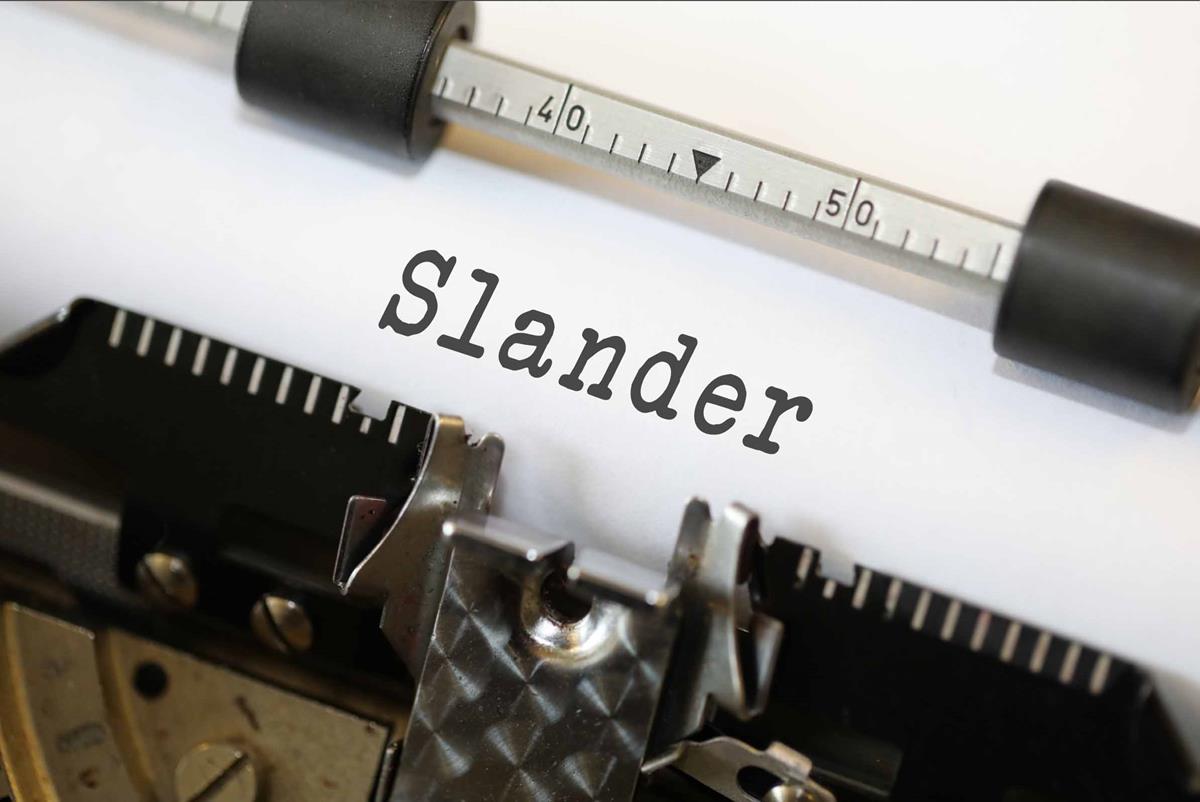“If you can’t say something nice, don’t say anything at all.”
While it is a rule that we should always abide by, it is not always obeyed. At some point in our lives, we have heard one person say or write something false about another person, but at what point do these statements become legally offensive? The statement will have to be false and cause personal damages in order for legal action to be taken.
Slander: Definition and Damages
- What is slander? Slander is the act of verbally speaking a false statement about a person that results in damaging a person’s reputation. The statement must be false to be slander.
- What damages can be caused by slander? Victims of false statements who have lost a job, faced harassment, or have lost their social status within their community have had their reputation damaged from slander.
Defamation vs. Slander vs. Libel
Defamation is the broad terminology used to describe false written and verbal statements that have caused personal damage to the accused. Defamation covers both slander and libel as a whole.
If the false accusations are verbal, the defamation is slander. Slander can be more difficult to prove than libel. The false statements will have to be proven through clear audio, or video recordings and damages will have had to occur for the offender to have slandered.

Libel is false accusations that have been printed, written, or published. These written statements may be published on a website/blog, in a magazine or newspaper, or any other form of written means. This defamation must be false and must cause damages to a person for the statements to be considered libel.
Internet Slander
As slander is a false statement that is verbally spoken, how can there be laws against slander on the internet?

Today, audio podcasts and video recordings can be found throughout the internet on a wide variety of platforms. At the touch of a finger, you can speak false statements and publish them on social media and other broadcasting websites.
If false statements have been made through the recording of an audio or video file and posted online, you can sue for slander. These statements have to be false and not a personal opinion, and you must have experienced damages in order for slander to have occurred.
Suing for Slander
If you can prove you have faced damages due to slander, you have the option to file a slander lawsuit. You must prove you have been personally damaged in order to sue for slander. Damages can include the loss of a job, the loss of a good quality reputation within the community, or any form of harassment. If these damages have occurred due to spoken false statements, you can sue the individual for slander.
How can you sue for slander if you don’t have proof of damages? Without proof that you have been personally damaged by slander, you will have difficulty pursuing legal action against a person. Damages must occur and be proven for legal action to be pursued.
Can I Sue Someone for False Accusations?
False accusations are defamation; however, the false accusations must result in damage to pursue legal action. This damage will need to be proven to file a slander lawsuit. Without proof of damage, you would be unable to file a civil lawsuit against someone for making false accusations.
Find a Lawyer
If you have been the victim of slander by facing personal damages from the false accusations, you can sue someone for slander. On the other hand, if you have made false statements that have personally damaged a person, you can be sued for slander.

Whether you are the plaintiff or the defendant, the first step a civil lawsuit is to find a lawyer who specializes in civil matters, such as defamation of character cases.
Slander lawyers will meet you, go over the details of your case, and file or respond to the lawsuit.
Slander Lawsuit Timeline
Once the lawsuit has been filed or responded to, your lawyer will request information from the counterparty, as well as provide information that the counterparty is requesting. During this phase, your lawyer will devise questions to ask during depositions and request various records as needed.
After both parties have reviewed the information that will be admissible during the hearing, a settlement offer may be presented. Civil cases are often settled outside of court through a settlement conference or through negotiations. If no settlement is made prior to the court date, then both parties will present their evidence at a trial.
When a civil lawsuit goes to trial, both parties will present evidence and call on the testimony of expert witnesses. If the slander lawsuit goes to trial, the damages done to the victim will have to be proven in court. Depending on the solidity of the evidence, a ruling in favor of the plaintiff may be difficult to obtain. Slander lawsuits are not criminal; therefore, the defendant will be facing compensation of damages rather than jail time.
Conclusion
You can sue for slander if you have been personally damaged by false statements spoken by an individual. You will need to provide proof that the individual spoke these false statements, and that the false statements resulted in damage to your reputation.
Defamation of character cases are civil cases that are frequently settled out-of-court. You will need to find a lawyer who specializes in civil lawsuits and explain your case to him or her. Your lawyer will gather information and devise a plan to prove the damage you occurred was because of the person’s slander.
Prior to the trial, a settlement conference or meeting will be scheduled between the parties to determine if a settlement can be reached. If a settlement can be reached, the lawsuit will not go to trial. If no settlement is reached, the lawsuit will go to trial where evidence and testimony will be presented from both parties, and a ruling will be made.
If you have more legal questions, you can also chat online with a Laws101.com attorney where you’ll be instantly connected to a lawyer who can give you legal guidance on your specific case or question.
